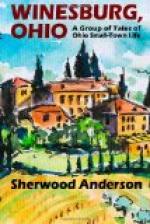Enoch wanted to talk too but he didn’t know how. He was too excited to talk coherently. When he tried he sputtered and stammered and his voice sounded strange and squeaky to him. That made him stop talking. He knew what he wanted to say, but he knew also that he could never by any possibility say it. When a picture he had painted was under discussion, he wanted to burst out with something like this: “You don’t get the point,” he wanted to explain; “the picture you see doesn’t consist of the things you see and say words about. There is something else, something you don’t see at all, something you aren’t intended to see. Look at this one over here, by the door here, where the light from the window falls on it. The dark spot by the road that you might not notice at all is, you see, the beginning of everything. There is a clump of elders there such as used to grow beside the road before our house back in Winesburg, Ohio, and in among the elders there is something hidden. It is a woman, that’s what it is. She has been thrown from a horse and the horse has run away out of sight. Do you not see how the old man who drives a cart looks anxiously about? That is Thad Grayback who has a farm up the road. He is taking corn to Winesburg to be ground into meal at Comstock’s mill. He knows there is something in the elders, something hidden away, and yet he doesn’t quite know.
“It’s a woman you see, that’s what it is! It’s a woman and, oh, she is lovely! She is hurt and is suffering but she makes no sound. Don’t you see how it is? She lies quite still, white and still, and the beauty comes out from her and spreads over everything. It is in the sky back there and all around everywhere. I didn’t try to paint the woman, of course. She is too beautiful to be painted. How dull to talk of composition and such things! Why do you not look at the sky and then run away as I used to do when I was a boy back there in Winesburg, Ohio?”
That is the kind of thing young Enoch Robinson trembled to say to the guests who came into his room when he was a young fellow in New York City, but he always ended by saying nothing. Then he began to doubt his own mind. He was afraid the things he felt were not getting expressed in the pictures he painted. In a half indignant mood he stopped inviting people into his room and presently got into the habit of locking the door. He began to think that enough people had visited him, that he did not need people any more. With quick imagination he began to invent his own people to whom he could really talk and to whom he explained the things he had been unable to explain to living people. His room began to be inhabited by the spirits of men and women among whom he went, in his turn saying words. It was as though everyone Enoch Robinson had ever seen had left with him some essence of himself, something he could mould and change to suit his own fancy, something that understood all about such things as the wounded woman behind the elders in the pictures.




